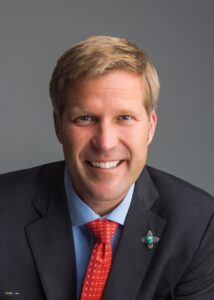Mayors have long been leading the charge on climate and at last, we have necessary support from the federal government to be even more ambitious with our local climate action. This is a historic moment for climate action in cities – we have the chance to go beyond our current emissions reduction targets. Climate Mayors across the country are meeting the moment and advancing sustainable infrastructure projects to help their cities adapt to the challenges of climate change. As Accelerator for America celebrates Infrastructure Week to highlight the benefits of, and ongoing need for increased investment in pipes, ports, roads, rails, and other infrastructure, Climate Mayors is recognizing how sustainable infrastructure projects can bolster resilience to extreme weather and climate change, boost clean energy jobs, strengthen and modernize our electric grid, and advance environmental justice:

Mayor LaToya Cantrell, New Orleans, LA – Resilience
Mayor LaToya Cantrell and The City of New Orleans secured funding from the Bipartisan Infrastructure Law for Bayou Bienvenue Central Wetlands project in the Lower 9th Ward. The Bayou Bienvenue Wetlands and surrounding communities suffered significant devastation by Hurricane Katrina in 2005. These funds will help the city get through significant public outreach and planning to restore and create natural buffers to help reduce the impacts of storms, rising sea levels, and other extreme weather events made worse by climate change.
The Bipartisan Infrastructure law made $10 million in funding available for habitat restoration and resilience awards for underserved communities through National Coastal Habitat Restoration and Resilience Grants.

Mayor Justin Bibb, Cleveland, OH – Workforce Development
Mayor Justin Bibb is using funding from the American Rescue Plan Act to help the City of Cleveland to invest in critical workforce development infrastructure that will provide the backbone for maximizing the benefits of federal funding from the Bipartisan Infrastructure Law, CHIPS Act and Inflation Reduction Act. The workforce development programs will bolster the pipeline of workers ready to build out the city’s green infrastructure, remediate brownfields, and deliver a clean energy economy.
The Coronavirus State and Local Fiscal Recovery Funds authorized by the American Rescue Plan Act provided billions of direct and flexible aid to America’s cities to support pandemic relief and spur economic recovery.

Mayor Satya Rhodes-Conway, Madison, WI – Public Transit
Mayor Satya Rhodes-Conway and Madison, WI, are taking advantage of federal dollars, including funding from the Bipartisan Infrastructure Law, to purchase 46 electric buses for the bus rapid transit program set to transform public transit in the city. The new all-electric rapid transit system will reduce travel times, better connect major employers and key parts of the city, increase mobility options, reduce pollution, and put the city on track to meet its climate goals. President Biden is right, “It’s a big deal”.
The Bipartisan Infrastructure Law includes $5.6 billion in funding to support the replacement of transit vehicles with low- and no-emission vehicles through the Low or No- Emission Bus Grants.

Mayor Kate Gallego, Phoenix, AZ – Water Security
Federal funding from the Bipartisan Infrastructure Law will help the City of Phoenix build an advanced water recycling system, providing a crucial boost to the city’s drinking water supply. As the West sufferers from a historic drought fueled by climate change, Mayor Kate Gallego is taking advantage of federal funds to invest in infrastructure that will ensure access to the region’s most vital resource in the years to come.
The Bipartisan Infrastructure Law provides $8.3 billion in Reclamation water infrastructure in the 17 Western States across nearly 20 programs to boost water security in the region.

Mayor Andre Dickens, Atlanta, GA – Environmental Justice
Mayor Dickens is using federal funding to re-connect neighborhoods and build a sense of community. The Stitch, an infrastructure project in Downtown Atlanta aiming to reconnect divided communities and restore environmental justice, received federal funding from the Reconnecting Communities program of the Bipartisan Infrastructure Law. The project will create a 14-acre green space park, provide affordable housing and transportation, and right historic wrongs over Interstate 75/85 intersection that deliberately divided a historically black community in the 1950s.
Bipartisan Infrastructure Law included historic funding to help reconnect communities through the Reconnecting Cities Pilot Program with a focus on prioritizing environmental justice communities.

Mayor Tim Keller, Albuquerque, NM – Green Space and Economic Development
Nearly $11.5 million from the Bipartisan Infrastructure Law is being used to transform Albuquerque’s defunct downtown rail line into a green pedestrian parkway that will reinvigorate the local economy and promote community connectivity. The Rail Trail envisions sustainable infrastructure that manages stormwater, features native plant species, and offers shade for visitors all while promoting economic development. Mayor Tim Keller is demonstrating how sustainability and economic development can go hand in hand.
RAISE Discretionary Grant Program helps communities build transportation projects that have significant local or regional impact and improve safety and equity. The Bipartisan Infrastructure Law included a $7.5 billion boost to RAISE grant programs.
